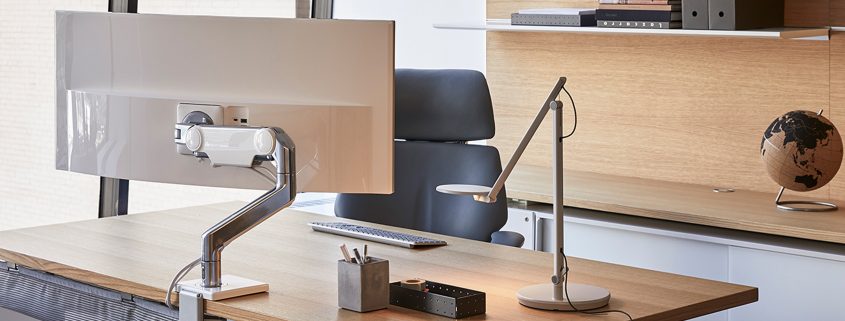Taking Care of Yourself During Remote Work
The COVID-19 pandemic has introduced workers from all industries to the concept of remote work. Although many employers originally only expected a 6-week “lockdown,” the need for social distancing has gone on for months, and it’s predicted that remote work will be a long-standing aspect of life for some time, if not a permanent staple of the modern workforce. However, working from home has its own challenges compared to traditional office work, and ignoring these issues can cause long-term health issues.
Mental Health
Most of us were not prepared for the isolation that social distancing and lockdowns bring, and it’s been proven that rates of depression and anxiety have increased since the pandemic began. Even if you began working from home long before the pandemic, some steps could be taken to ensure safe socializing and preserve your mental health.
Working from home can cause many distractions, especially if there are small children, pets, spouses or other family members in the home. If possible, find a place free from distractions, such as a spare room, a garage, or even sectioning off a part of a bedroom or living room to be a dedicated office area. Working in the same area you sleep also makes it more difficult to unplug from work, leading to more anxiety and stress.
It’s important to take time to socialize, even if you’re a natural introvert. If possible, consider visiting with friends and family while wearing a mask and staying at least 6 feet apart. If in-person gatherings aren’t an option for you right now, it’s also beneficial to communicate virtually, whether it be a phone call, messaging app or videoconference.
If you still feel stressed about remote work after trying these tips, consider making an appointment with a counselor or therapist. Many mental health professionals are offering phone or video appointments, meaning you can get the help you need without having to leave the safety of your home.
Physical Health
Although public safety measures like working from home can affect your mental health, it’s also important to think about your physical health.
For example, most in-office workers walk around the building throughout the day, take the stairs to and from their workstation, go for a walk during their lunch hour, or park far away from the office to help increase the amount they move during the day. While working from home, many of these actions are no longer possible. However, getting in physical activity (ideally at least 30 minutes a day) is still very important for your health. Consider upping your physical activity by scheduling time for a walk, run, or bike ride each day. Select ergonomic seating and height-adjustable desks. If that’s not possible, there are many free indoor workout routines available to help you get your blood pumping every day from home.
Another important point to consider is that most offices have invested thousands of dollars into ergonomic furniture, like desk, chairs, keyboards and lighting. However, it’s likely that your home office is not equipped with these features. Spending several hours a day in unnatural positions can cause many health issues, such as carpal tunnel syndrome, back pain, neck pain, vision problems, and more.
To avoid these issues, consider placing your home office in an area that receives a lot of natural light, is further away from household distractions, and is in an area that makes you feel good. Making sure your equipment is designed with ergonomics in mind is also very important. Our showroom has ergonomic chairs and height-adjustable desks in-stock. We have taken precautions to create a safe environment for you to browse. This may be a large investment, but if you or someone in your household will be working or learning, from home for some time, it’s well worth the cost.
If money is prohibiting you from purchasing the equipment necessary for a home office, there are several different options. You could ask your employer to cover the cost of a home office. It’s not a guarantee that your employer will cover these costs, but many companies are realizing that comfortable workers are productive workers and giving employees a stipend for home office supplies. Even if your company doesn’t currently offer this, it may be worth bringing up to your manager or HR and explaining the benefits of investing in this kind of program.
Of course, your employer may not offer any sort of stipend and be unwilling to compromise. In that case, another option would be to take out a home equity loan if you currently own your property. If not, you could always try to set up a payment plan with the company you’re purchasing supplies from or use a credit card. We provide financing options for most purchases, so ask us about it.
Remote work has presented new health and wellness challenges to employees across the country. This was not an expected arrangement for most people, but that doesn’t mean we shouldn’t learn to adjust and take care of ourselves during the remote work experiment. By following these tips, it’s possible to not only survive but thrive during this period of extended remote work.
 MEET JULIE SHEAFFER: She can help you navigate the changes ahead and keep your home office connected and holistic by design. If you are ready for a change, contact Julie at 888-910-3769 x 129 or julie@officefurniturenow.com. For more inspiration visit us on Facebook, Pinterest, and Twitter!
MEET JULIE SHEAFFER: She can help you navigate the changes ahead and keep your home office connected and holistic by design. If you are ready for a change, contact Julie at 888-910-3769 x 129 or julie@officefurniturenow.com. For more inspiration visit us on Facebook, Pinterest, and Twitter!



